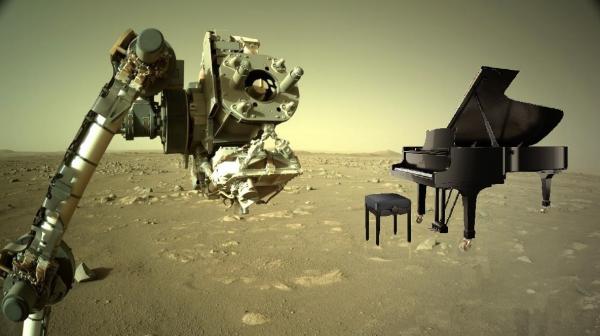What Would Music Sound Like on Mars?

Alert readers will recall that I previously described the microphones on board the Perseverance rover here and here. Scientists have been busy playing with that toy, and in fact have learned a lot about audio on the red planet.
As you know, the sounds we hear are a function of the source, the receiver, and the transmission medium in between. The latter is particularly interesting because the medium profoundly affects what we hear. For example, if there is a wall between the source and you, what you hear will be quite different than with an open-air path. Also, the density, temperature, and chemical composition of the medium affects the speed of sound.
All of which brings us to sound on Mars. The Martian atmosphere is quite unlike Earth's atmosphere so sounds on Mars would sound quite different. Granted, you don't want to wander around Mars without your life-sustaining helmet firmly in place. But if you did, the atmosphere there would make things sound pretty strange.
For starters, the Martian atmosphere is tenuously thin, with a density that is about 1/100 of that on Earth. With fewer molecules to convey sound, relatively speaking, sound struggles to propagate. Less energy is conveyed so sound levels are reduced. Also, the atmosphere is about 96% carbon dioxide, and the average surface temperature is a bracing -81F. At nominal Martian conditions, the speed of sound is a leisurely 787 feet per second versus a nominal 1,115 feet per second on Earth.
Moreover, because of the unique properties of the very low-pressure carbon dioxide atmosphere, it also appears that frequencies below 240 Hz travel even slower – around 754 feet per second. How weird is that? Sounds on Earth within our audible bandwidth travel at the same speed in a medium. But on Mars, audible sounds travel at different speeds. So far, researchers believe that Mars is the only planet in the solar system where this occurs. They are calling it the "Mars idiosyncrasy."
So, here you are on terra firma, listening to your stereo. Now imagine that your stereo and you are on Mars. Your stereo is the same, your ears are the same, but how would the Martian atmosphere change the sound? We don't have to travel to Mars to find out. This NASA webpage lets you visit virtually. First, click on the Mars playlist at the top of the page; check out some actual recordings of sounds on Mars. Hmm, the sounds are so foreign that it's hard to imagine what familiar sounds would sound like.
Fortunately, this webpage also has simulations of what several common sounds would sound like on Mars. Click on the Earth playlist and switch between Earth sounds and the Mars simulations. I suggest that you start with the “Ocean Waves” clip. That broadband noise-like signal shows how dramatically the high-frequency response is rolled off on Mars. Likewise the “Bicycle Bell” sounds distant and dull. Finally, check out “Clair de Lune.” Sounds lovely on Earth. Somewhat less so on Mars. I can't immediately hear that wacky speed of sound idiosyncrasy thing, but maybe you can do some analysis to tease it out of these clips.
Interestingly, the NASA webpage also lets you see what your voice would sound like on Mars. Record a snippet and check it out. May I suggest the phrase, “Hey guys! My helmet just fell off. No problem. I'll hold my breath until I get back to base.”





























































